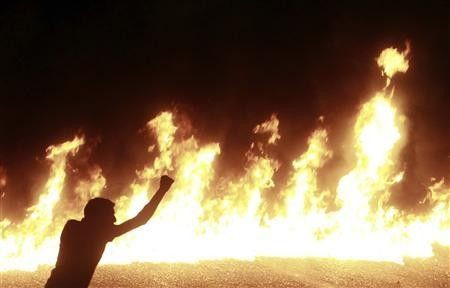Egyptians Reject Army's Account of Deadly Coptic Protests

Journalists and witnesses are challenging the Egyptian government's account of Coptic-led protests that turned deadly, charging that the Egyptian military provoked violence and later attributed it to sectarian tension.
The protests began with Coptic Christians demanding more protection and reforms from the government. Copts, who make up about 10 percent of Egypt's population, have endured a string of church burnings since former presidents Hosni Mubarak's ouster, and many are frustrated that the interim government has not relaxed limits on church building.
The demonstration soon spiraled into violence, with at least 25 reported deaths. In a press conference convened the following morning, Prime Minister Essam Sharaf warned ominously of vague outside forces that had instigated the bloodshed.
Instead of advancing to build a modern state of democratic principles, we are back searching for security and stability, worrying that there are hidden hands, both domestic and foreign, seeking to obstruct the will of Egyptians in establishing a democracy, Sharaf said on state television. We will not surrender to these malicious conspiracies and we will not accept reverting back, he added.
But numerous accounts seemed to clearly show that the military had brutally attacked protestors without provocation. Sarah Carr, a journalist for the publication Al-Masry Al-Youm, wrote of armored personnel carriers plowing through the crowd and firing indiscriminately.
Even while the wounded were still being brought in, state TV was reporting that Christian protesters stole weapons from the army and killed soldiers, and that the busy foreign hands are back again, still trying to destabilize Egypt, Carr wrote.
Journalist Hossam el-Hamalawy reported that the state television channel had called on people to protect the soldiers from Coptic protestors, and that during the protest the military had shut down two television stations that were broadcasting images of the chaos. Protestors reportedly chanted Muslims and Christians... One hand! and Death to the Field Marshal -- a reference to Field Marshal Mohamed Hussein Tantawi, head of Egypt's ruling military council, -- belying the official story that the demonstrations were driven purely by sectarian antagonism.
The protesters are not only Copts, Hamalawy wrote. There are Muslims present in the protests too and are talking active part in resisting the police and the army.
The violence produced calls for the governing Supreme Council of Armed Forces, Egypt's de facto ruler since Mubarak fell, to hand off power to a civilian governing authority.
You can contact the reporter at j.white@IBTimes.com
© Copyright IBTimes 2024. All rights reserved.





















